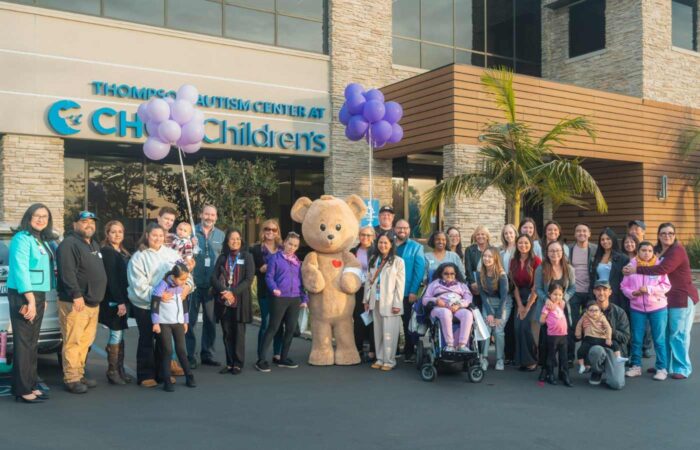CHOC is proud to announce the opening of the Rett Syndrome Center of Excellence, located within the Thompson Autism and Neurodevelopmental Center at CHOC. This clinic is recognized as the 21st Center of Excellence in the United States by the International Rett Syndrome Foundation (IRSF), the leading advocacy and research organization for this rare condition.
“Although Rett syndrome affects only around 1 in every 10,000 girls, there is no known cure and few treatment options for this debilitating neurodevelopmental disorder,” says Dr. Pilar Pichon, pediatric epileptologist and child neurologist at CHOC and associate professor of health sciences at UC Irvine. “As a Center of Excellence, CHOC will now be at the forefront of Rett syndrome care in California. We will be a medical home for patients and their families, but we also hope to be an innovative center for research to move the field forward, eventually toward the possibility of a cure.”

The critical need for better Rett syndrome treatments
Rett syndrome is caused by mutations to the methyl CpG binding protein 2, or MECP2, gene, which slows brain development in early childhood and eventually affects every aspect of a child’s life. The condition has an early onset: After initially normal development in the first 6 to 18 months of life, a child’s development will then regress and stall on and off throughout childhood, with progressive deterioration seen after age 10. Almost all patients affected are female.
The hallmarks of Rett syndrome include repetitive hand movements while awake, motor deterioration, slowed growth, breathing difficulties, seizures, behavioral issues, scoliosis, digestive problems, muscle weakness, trouble walking, heart problems and lack of communication skills or verbalization.
The FDA approved the first treatment for children with Rett syndrome in 2023. This medication, Trofinetide, may help improve physical and behavioral symptoms of Rett syndrome in children. Clinical trials have recently wrapped up for Blarcamesine, another medication that may improve symptoms.
“Trofinetide can help patients be more interactive, but it is not a cure,” Dr. Pichon says. “However, new gene therapies may be potentially curative.”
Clinical trials for gene therapies
As an ISRF Center of Excellence, CHOC will now be able to offer clinical trials for gene therapies to patients. The clinic is currently seeking Institutional Review Board approval to become a trial site for gene therapy.
“Gene therapies have been able to reverse Rett syndrome in mice, so the potential for it to be reversible in humans is worth investigating,” Dr. Pichon says. “But we need to do the clinical trials to make sure the therapies are safe and efficacious.”
Finding that balance is why clinics such as CHOC’s new Center of Excellence will be important going forward.
“Once we get the clinical trial going, we can recruit patients and follow them longitudinally, even past age 21,” Dr. Pichon says. “However, recruitment may be a challenge, as Rett syndrome is so rare. We hope that by becoming a Center of Excellence, we can increase referrals from surrounding areas and offer patients these potentially groundbreaking gene therapies.”
Advancing new frontiers in Rett syndrome treatment
Beyond gene therapy, Dr. Pichon hopes to expand research into other treatment options for people with Rett syndrome.
“CHOC will be at the forefront in investigating whether neuromodulation such as deep brain stimulation (DBS), which can improve symptoms of the movement disorders that we see in Rett syndrome patients,” Dr. Pichon says. “We have such a robust Movement Disorders DBS program. I would like to collaborate with them to study how patients with Rett’s syndrome can benefit from DBS. As a pediatric epileptologist, I would also like to do a baseline neurophysiological study of our patients and see if there is a biomarker that can predict who will go on to have refractory epilepsy in the future.”
Dr. Pichon plans to study the role of EEG and polysomnography as prognostic tools in predicting the neurodevelopmental trajectory of these patients.
“Since we will be following them longitudinally, my hope is that if we start with a baseline assessment, there will be a way for us to predict their prognosis as they hit adolescence or adulthood,” Dr. Pichon says.
CHOC will also collaborate with the other Rett syndrome Centers of Excellence across the country, including the California clinics at Children’s Hospital Los Angeles, Rady Children’s Hospital-San Diego and UCSF Benioff Children’s Hospitals.

Making a medical home
Although finding a cure for Rett syndrome is the dream for Dr. Pichon, providing exceptional clinical care for all patients is her first priority.
“We envision being a medical home for these patients, whether they are 18 months, 18 years or older,” Dr. Pichon says. “Patients can still continue care with their primary neurologist and primary care physician, but they can come to our clinic and get regular care from us and our specialists as well.”
In addition to clinical trials and research, the Center of Excellence will provide patients and their families with access to community resources, family support and up-to-date information on the advances being made in Rett syndrome care and research.
“A diagnosis of Rett syndrome can be very challenging for caregivers,” Dr. Pichon says. “Now with the combined resources of IRSF and CHOC, we have access to more funding and support that may help both patients and families.”
Discover more about groundbreaking care for Rett syndrome at the CHOC Neuroscience Institute.




